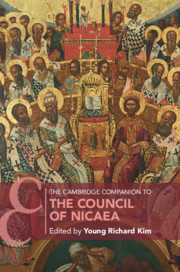Book contents
- The Cambridge Companion to the Council of Nicaea
- Cambridge Companions to Religion
- The Cambridge Companion to the Council of Nicaea
- Copyright page
- Dedication
- Contents
- Figures
- Contributors
- Acknowledgements
- Abbreviations
- 1 Introduction
- Part I Contexts
- 2 Imperial Fathers and Their Sons
- 3 Arius and Arianism
- Part II The Council
- Part III Outcomes
- Part IV The Aftermath
- Part V The Long Reception
- Appendices
- Bibliography
- Index
- References
2 - Imperial Fathers and Their Sons
Licinius, Constantine, and the Council of Nicaea
from Part I - Contexts
Published online by Cambridge University Press: 17 December 2020
- The Cambridge Companion to the Council of Nicaea
- Cambridge Companions to Religion
- The Cambridge Companion to the Council of Nicaea
- Copyright page
- Dedication
- Contents
- Figures
- Contributors
- Acknowledgements
- Abbreviations
- 1 Introduction
- Part I Contexts
- 2 Imperial Fathers and Their Sons
- 3 Arius and Arianism
- Part II The Council
- Part III Outcomes
- Part IV The Aftermath
- Part V The Long Reception
- Appendices
- Bibliography
- Index
- References
Summary
During the formative period of disputation over the theology of Arius, the emperor Licinius ruled over the eastern Roman provinces. The emperor Constantine was directly involved in the doctrinal controversy only after his victory over Licinius in 324. But Constantine’s engagement in imperial politics had already shaped his thinking about theology. In imperial successions sons were sometimes promoted but also sometimes overlooked. Emperors introduced a new five-year cycle for calculating taxes and often held annual consulships. Emperors identified with deities such as Jupiter and Hercules. At the Council of Nicaea, Constantine was hence ready to debate with bishops over the theology of Father and Son, the annual date of Easter, and the simultaneous divinity and humanity of Jesus Christ. One bishop who attended the council was Eusebius of Caesarea, whose panegyric equated the emperor with the Son of God. Constantine himself strengthened the association by funding churches in honor of Jesus’s nativity and resurrection in the Holy Land and by publicizing a story about his own vision of a cross in the sky. The Council of Nicaea had been a crucible for the formation of both a theology of God and a political philosophy of a Christian emperor.
Keywords
- Type
- Chapter
- Information
- The Cambridge Companion to the Council of Nicaea , pp. 19 - 42Publisher: Cambridge University PressPrint publication year: 2021
References
Select References
- 1
- Cited by

